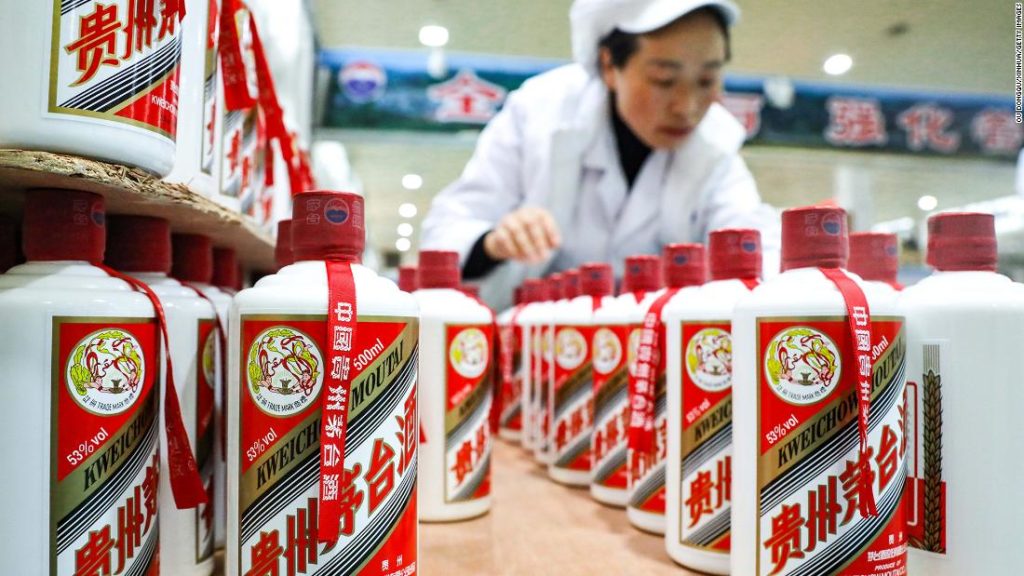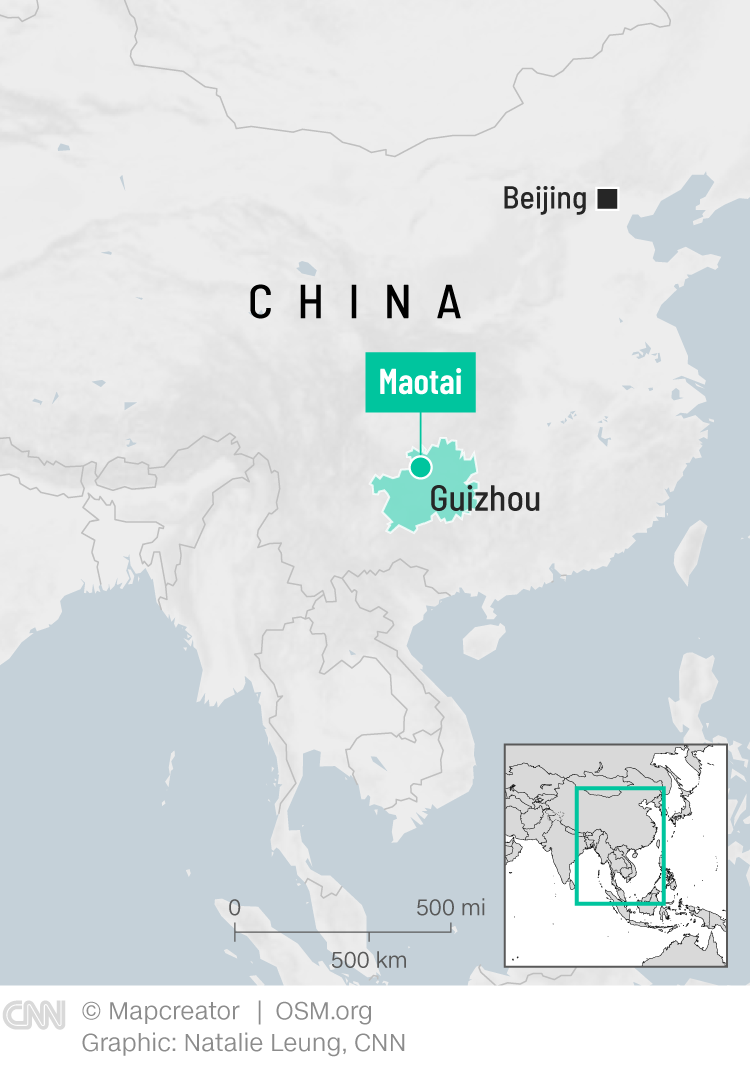At 1,498 yuan, or $209 for a half-liter bottle, it might not sound like the kind of bargain Costco shoppers usually go for — but in this case, it absolutely was. That price represented a steep discount over Moutai sold elsewhere — that is, if you could get your hands on it. The luxury spirit is so beloved in China, it sold out quickly.
“Anytime they have any stock [of the product] available, it’s going to be gone almost instantly,” said Ben Cavender, the Shanghai-based managing director of China Market Research Group. “You’ll see people clamoring [for it].”
Apart from the Chinese diaspora, however, Moutai is still virtually unknown overseas. Almost all — about 97% — of its sales come from China alone, according to its financial reports.
So how is a company that sells its products primarily in just one country now worth more than some longstanding global behemoths? And can Kweichow Moutai, which is described by some Westerners as “drinking liquid razor blades,” succeed in appealing to non-Chinese consumers?
From historic icon to status symbol
Moutai has one unmistakable advantage: the drink is China’s national spirit.
Moutai baijiu — the type of liquor the company makes — is a clear, potent spirit that’s been dubbed “firewater,” thanks to the fact that it’s 53% alcohol. The red-and-white bottles of its flagship product, “Feitian,” or “Flying Fairy,” are a staple at Chinese state banquets and business events.
Being part of so many major public events in China “really set the brand in the national consciousness,” said Cavender, who likened it to another giant beverage maker, Coca-Cola, in that regard.
A Moutai representative declined requests to be interviewed for this story.
Legend has it that members of the Red Army even used to turn to the drink to knock themselves out before surgery, said Hao Hong, head of research at BOCOM International, the securities arm of China’s Bank of Communications.
“It’s a story [that goes around],” he said. “They didn’t have anesthesia. So they had to use Moutai as a drug to numb [people] from surgery.”
Moutai has found a way to be “approachable for a lot of regular consumers, at least for special occasions,” while at the same time also offering collectors’ items that reach the ultra-rich, said Cavender.
“That’s something that makes Moutai, I think, different, from a lot of the international beverage brands,” he said.
It’s also been a tremendous advantage during an economically tough year: wealthy consumers who are spending less on travel may splurge more on liquor, Cavender added.
A meteoric rise
In 2020, Moutai’s shares soared 69% to record highs.
Hong said that he believed there was no major impetus for the rally last year; just that “most people are gradually realizing the ability of this company to be able to generate strong cash flow and no debt.”
“It’s like a badge of honor for value investing,” he added. “People love the stock — because year after year, it just continues to deliver.”
Li said he was excited to buy in because it was clear from the beginning that the company was “financially healthy,” and able to reward shareholders with a generous dividend.
Since then, he’s invested more than 136,000 yuan (about $21,000) into the stock. The payoff has been huge: a few years ago, he made enough to put his son through university.
“The dividend [alone] each year could cover my daily expenses,” said Li, who plans to hold onto the stock indefinitely. “It’s also going to help me to afford medical bills and nursing home expenses.”
Cheng, who has since maintained that position, argues that the company’s prospects are overblown, and that “the market has already reflected all the positives of the past 10 years.”
“Being the only hater is really difficult for me,” he said with a laugh. “I think it’s a bubble here.”
“It’s important for Kweichow Moutai … to stick to its slow pace,” Xinhua said in an editorial. “Pulling up a plant to make it grow inevitably leads to unbearable pain. Short-sighted speculation will cause tremendous damage to the value of investment.”
The making of Moutai
One of Moutai’s biggest advantages is its ability to keep the price of its product high. It claims to have limited capacity since it can only produce its drinks in one place.
Similar to champagne — which comes from the eponymous region in France — Kweichow Moutai is named after Maotai, a picturesque small town in the southwestern Chinese province of Guizhou. (The company’s name is based on an old romanization of the town’s Chinese name.) Like champagne, the drink can only be called Moutai if it’s produced in that specific location.
This is where the company says its baijiu — distilled from fermented sorghum and rice — gets the magic touch.
Environmental factors, such as the town’s climate and seasonal changes in the water of the local river, help give the liquor its unique taste and is “beneficial to the production process,” according to the Moutai Museum.
Inside the town, Moutai’s impact on the economy is deeply felt.
As of 2019, Maotai was the richest town in western China, according to disposable income statistics from the municipal government of Renhuai, in Guizhou province. (Guizhou is among the country’s poorest regions.)
That would never have happened if it weren’t for the beverage giant, said Qi Wang, a local resident.
“Kweichow Moutai is the leader of Maotai,” he said, adding that the company’s boom helped encourage him to open his own liquor factory. “It influences all aspects of the town’s development.”
Its close ties with the government don’t always guarantee protection, though.
The campaign led to “unprecedented pressure” on the alcohol industry, Moutai noted in an earnings report.
Sales still grew that year, but only around 17%, compared to 44% the previous year. In 2014, that number plunged to about 2%.
Is China enough?
Moutai has an outsize reliance on the Chinese market.
But for the most part, it’s had little to show for it. In 2019, almost 97% of sales still came from China.
The campaign demonstrated an effort to stay connected with international consumers, even during the pandemic. But analysts have pointed to other challenges ahead.
Moutai needs to do more to diversify, according to Spiros Malandrakis, industry manager of alcoholic drinks at Euromonitor International. “It needs to have started yesterday,” he said. “International spirits always start local, like baijiu, but they become international. That’s the key. That’s how you take over the world. That’s how you become sustainably big.”
Malandrakis pointed to Mexican tequila, Russian vodka and American bourbon as examples. None of those “would have survived” if they didn’t go global, he added.
The process, of course, doesn’t happen overnight.
William Dong, managing director of Evershine Australia, which distributes Moutai in Australia, New Zealand and Italy, said that many people still need to be educated about what baijiu even is.
“We have distributed the product into basically everywhere that we could,” he said in an interview from Sydney.
At the end of the day, most customers are still Chinese, he added. “I would say probably 80%.”
“[Some] Westerners find it, and I quote, ‘kind of like drinking liquid razor blades,'” said Malandrakis.
An even bigger threat, however, may be generational and gender gaps within China. Currently, the core demographic for baijiu is 40 to 60-year-old men, according to Malandrakis.
“The next generation of drinkers does not particularly want to do exactly what their father’s generation did,” he explained. “It’s not great for the future, if you don’t start having new people coming in.”
Malandrakis compared it to sherry, which was loved for centuries but later fell out of popularity as it “became synonymous with consumption of older populations.”
Not everyone is so worried. Even with its weak international position, Moutai’s baijiu was the world’s best-selling liquor in 2019, according to Euromonitor.
“The Chinese market is so big, and it’s continuing to become more wealthy,” said Cavender. He also noted a recent swell in local pride, which could draw more domestic consumers in.
For all its challenges, even critics admit the company’s dominance is nowhere near diminishing.
“The brand — and the heritage that the brand has — it’s really impossible to replicate that,” Cavender said. “Somebody can’t set up a new venture tomorrow and do what they can do. It’s not sort of possible to go back in time and get Mao Zedong to be interested in your drink. It’s not possible to sort of be located in the town where they make their products. So I think they have a strong built-in story that allows them to flourish.”
CNN’s Beijing bureau and Serenitie Wang contributed to this report.
You may also like
-
Afghanistan: Civilian casualties hit record high amid US withdrawal, UN says
-
How Taiwan is trying to defend against a cyber ‘World War III’
-
Pandemic travel news this week: Quarantine escapes and airplane disguises
-
Why would anyone trust Brexit Britain again?
-
Black fungus: A second crisis is killing survivors of India’s worst Covid wave


